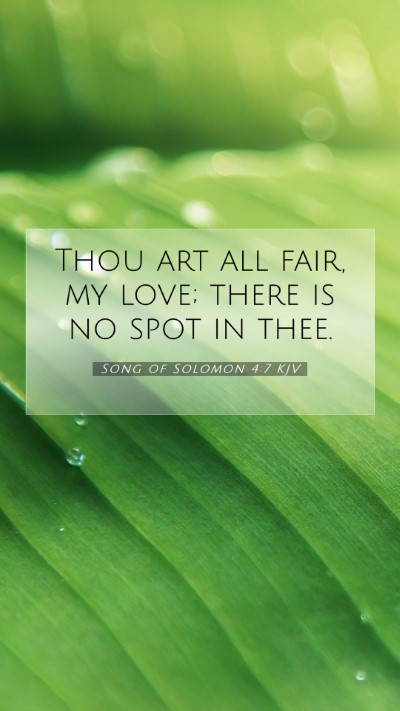Understanding Song of Solomon 4:7
Verse: "Thou art all fair, my love; there is no spot in thee." - Song of Solomon 4:7
The verse from the Song of Solomon, or Song of Songs, is a beautiful declaration of love, showcasing the affectionate dialogue between the bridegroom and the bride. It serves to illustrate the intimacy and purity of love, portraying the beloved as perfect and without blemish. This exploration provides insights into the biblical perspective of love and the characteristics of those who are cherished.
Bible Verse Meanings
The phrase "Thou art all fair, my love" indicates a totality of beauty that is both outward and inward. It emphasizes the complete admiration the bridegroom holds for his bride, reflecting the theme of divine love throughout the scriptures.
Bible Verse Interpretations
- The concept of "no spot in thee" speaks to the absence of flaw or imperfection, often interpreted as a metaphor for spiritual purity and completeness.
- This language can be seen as a reflection of God’s view of His people, where, through redemption, believers are considered faultless in Christ.
Bible Verse Understanding
This verse forms part of the larger lyrical context of the Song of Solomon, which is characterized by poetic expressions of love and desire. The passionate imagery and metaphorical language require careful reflection to grasp the depth of its significance.
Bible Verse Explanations
Commentaries provide rich explanations for this verse. For instance, Matthew Henry emphasizes the desire and pleasure found in love, noting that the bridegroom’s proclamation is not just about outward beauty, but reflects inner virtue as well.
Albert Barnes adds that the expression illustrates the relationship between Christ and the Church, suggesting a spiritual union where the Church is seen as without blemish due to the sanctifying work of Christ.
Adam Clarke interprets this declaration as an indication of the purity and sanctity of love, reminding readers that such love is not conditional on external standards but is an expression of deep commitment and unity.
Bible Verse Commentary
Commentaries from these authors emphasize the importance of context in interpreting this romantic dialogue. The Song of Solomon, often categorized as wisdom literature, serves as both a literal expression of love and a metaphorical representation of God's love for His people.
Key Insights from Commentaries
- Beauty and Purity: The acknowledgment of beauty serves as an introduction to the idea of moral and spiritual integrity.
- Divine Love: The verse illustrates the divine love that sees the believer as pure, echoing the theological concepts found in New Testament writings.
- Romantic Imagery: The use of romantic imagery is significant, highlighting the depth of emotional connection and intimate commitment in relationships.
Cross References
- Isaiah 61:10 - "I will greatly rejoice in the Lord, my soul shall be joyful in my God; for he hath clothed me with the garments of salvation, he hath covered me with the robe of righteousness."
- Matthew 5:8 - "Blessed are the pure in heart: for they shall see God."
- Ephesians 5:27 - "That he might present it to himself a glorious church, not having spot, or wrinkle, or any such thing; but that it should be holy and without blemish."
Conclusion
In Summary, the verse Song of Solomon 4:7 captures the essence of love as seen through the lens of beauty, purity, and intimate connection. The insights gathered from public domain commentaries enrich our understanding, establishing a profound theology of love that resonates with both romantic relationships and the divine love showcased in Scripture.


